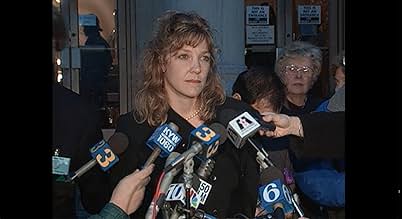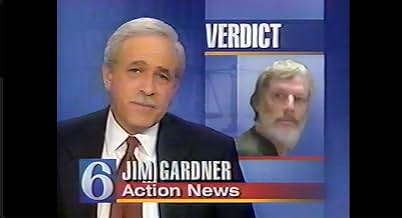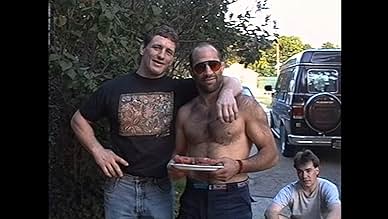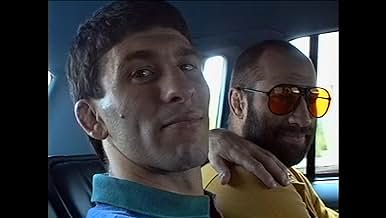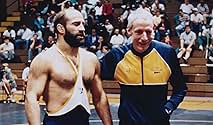IMDb रेटिंग
7.2/10
7.6 हज़ार
आपकी रेटिंग
अपनी भाषा में प्लॉट जोड़ेंDocumentary filmmaker Jon Greenhalgh examines the life of Dave Schultz, a professional wrestler who was part of 'Team Foxcatcher', funded by multi-millionaire John du Pont.Documentary filmmaker Jon Greenhalgh examines the life of Dave Schultz, a professional wrestler who was part of 'Team Foxcatcher', funded by multi-millionaire John du Pont.Documentary filmmaker Jon Greenhalgh examines the life of Dave Schultz, a professional wrestler who was part of 'Team Foxcatcher', funded by multi-millionaire John du Pont.
- पुरस्कार
- 3 कुल नामांकन
John du Pont
- Self - Founder, Team Foxcatcher
- (आर्काइव फ़ूटेज)
Dave Schultz
- Self - Foxcatcher Wrestler
- (आर्काइव फ़ूटेज)
Nancy Schultz Vitangeli
- Self - Dave's Wife
- (as Nancy Schultz)
Valentin Yordanov
- Self - Foxcatcher Wrestler
- (as Valentin Jordanov)
- …
फ़ीचर्ड समीक्षाएं
This is an incredible documentary!
It contains actual footage and home videos from Dave Schultz's life.
The film serves as a great tribute to Dave, his family, friends and wrestlers.
I had the privilege of viewing it at the Tribeca Film Festival in New York City. When I got home, I watched it again. It is THAT good!
It contains actual footage and home videos from Dave Schultz's life.
The film serves as a great tribute to Dave, his family, friends and wrestlers.
I had the privilege of viewing it at the Tribeca Film Festival in New York City. When I got home, I watched it again. It is THAT good!
I had vaguely heard of this incident around the time the notable movie came out in 2014, but I hadn't had much interest until I saw a youtube video that covered the incident more in-depth. That drew me to this documentary film.
This film is kind of a mixed bag. The focus of the youtube video I saw was almost entirely on John DuPont, whereas this one is much more spread around in terms of its protagonists. Unfortunately, as a result there's very little that we get much depth to. We hear a lot about how Dave Schultz was a great and kind person, but don't really get to see too much of it in action, either through home video footage (of which they use a lot of) or personal stories told by others.
The pacing is very slipshod, as the timeline is given almost no importance whatsoever. I had no idea what year John DuPont got into wrestling, what year "Team Foxcatcher" started, or what year certain people were booted from the team, and had to largely piece together the timeline of events from timestamps on home video footage and guesswork based on the 4-year spacing of the Olympic games.
The overall problem with this is it gives an almost heady, dreamlike trip through the events at DuPont's manor and the team, in which a lot of detail is either compressed or skipped over, and thus very little ends up being retained by the end of it.
Too little attention is given to a great number of characters who appear, have their problems with John, and end up quitting or being kicked out by John as he becomes increasingly paranoid and psychotic. A lot of the home movie footage ends up just being random snippets taken of some of the wrestlers filming their families or their training, and often played with little or no context, just as something to look at while telling the story.
The tragic incident, when it comes, is almost anticlimactic. After so little focus is given on any one particular person or group of persons, there seems to be almost no warning or justification to the murder when it happens. If this was how it actually felt for those living at the mansion, nothing in the interviews or the narrative clues us in to that, particularly as we start getting to incidents with John roaming around the grounds of his property, often drunk and pointing guns at people, or the absolutely psychotic paranoia that leads him to banning the color black from his property, leading him to fire the black wrestlers on his team, which are treated less as serious incidents and more along the lines of "Wow this guy is kind of wacky, isn't he?"
Other instances of the use of home footage seem somewhat unnecessary, particularly the film shot by John himself, including footage of just the woods outside his property. People interviewed tell us the context of this footage, that John was absolutely convinced there were people hiding in the background or artificial trees spying on him, but the footage itself is absolutely unnecessary when the interviewees themselves are highly effective at conveying the extreme unease of a paranoid John showing them video footage he took and ranting at them about robotic trees or whatever.
Probably the worst aspect of this documentary overall is that rather than being complete or semi-complete overview of Team Foxcatcher and the people involved, it left me wanting more. It felt like the most basic kind of introduction to someone completely unfamiliar with the events, not as a means of educating them, but more as an introduction, waiting for some other source to fill in the rest.
It's not a very good sign for a 90ish minute documentary that I feel that I actually got more in-depth information from a 5 minute youtube video segment than I got from this entire film.
This film is kind of a mixed bag. The focus of the youtube video I saw was almost entirely on John DuPont, whereas this one is much more spread around in terms of its protagonists. Unfortunately, as a result there's very little that we get much depth to. We hear a lot about how Dave Schultz was a great and kind person, but don't really get to see too much of it in action, either through home video footage (of which they use a lot of) or personal stories told by others.
The pacing is very slipshod, as the timeline is given almost no importance whatsoever. I had no idea what year John DuPont got into wrestling, what year "Team Foxcatcher" started, or what year certain people were booted from the team, and had to largely piece together the timeline of events from timestamps on home video footage and guesswork based on the 4-year spacing of the Olympic games.
The overall problem with this is it gives an almost heady, dreamlike trip through the events at DuPont's manor and the team, in which a lot of detail is either compressed or skipped over, and thus very little ends up being retained by the end of it.
Too little attention is given to a great number of characters who appear, have their problems with John, and end up quitting or being kicked out by John as he becomes increasingly paranoid and psychotic. A lot of the home movie footage ends up just being random snippets taken of some of the wrestlers filming their families or their training, and often played with little or no context, just as something to look at while telling the story.
The tragic incident, when it comes, is almost anticlimactic. After so little focus is given on any one particular person or group of persons, there seems to be almost no warning or justification to the murder when it happens. If this was how it actually felt for those living at the mansion, nothing in the interviews or the narrative clues us in to that, particularly as we start getting to incidents with John roaming around the grounds of his property, often drunk and pointing guns at people, or the absolutely psychotic paranoia that leads him to banning the color black from his property, leading him to fire the black wrestlers on his team, which are treated less as serious incidents and more along the lines of "Wow this guy is kind of wacky, isn't he?"
Other instances of the use of home footage seem somewhat unnecessary, particularly the film shot by John himself, including footage of just the woods outside his property. People interviewed tell us the context of this footage, that John was absolutely convinced there were people hiding in the background or artificial trees spying on him, but the footage itself is absolutely unnecessary when the interviewees themselves are highly effective at conveying the extreme unease of a paranoid John showing them video footage he took and ranting at them about robotic trees or whatever.
Probably the worst aspect of this documentary overall is that rather than being complete or semi-complete overview of Team Foxcatcher and the people involved, it left me wanting more. It felt like the most basic kind of introduction to someone completely unfamiliar with the events, not as a means of educating them, but more as an introduction, waiting for some other source to fill in the rest.
It's not a very good sign for a 90ish minute documentary that I feel that I actually got more in-depth information from a 5 minute youtube video segment than I got from this entire film.
Schulz became the scapegoat? All got his share and poor d paid the bill eh?
Shame on all of them.
Shame on all of them.
10olyref
Excellent piece from those who were actually there. No punches pulled, straight forward and truthful. I will never forget where I was when I heard Dave was murdered.
It was very difficult seeing this replayed but I feel it was the best of the three films on the subject. The movie Foxcatcher was well acted and the 30 for 30 Documentary was also well done, however I feel this was the better of the three.
Whenever I am at a wrestling event and I hear our national anthem, I always think of Dave on the podium in LA with the gold medal and his smile.
It was very difficult seeing this replayed but I feel it was the best of the three films on the subject. The movie Foxcatcher was well acted and the 30 for 30 Documentary was also well done, however I feel this was the better of the three.
Whenever I am at a wrestling event and I hear our national anthem, I always think of Dave on the podium in LA with the gold medal and his smile.
The story behind Team Foxcatcher captured the imagination of the nation during the 1990s. A man in John Du Pont, desperate to put some stamp on the athletic world, killing one of the best wrestlers in United States' history. It divided the team and ultimately led to more drama off the mat than on.
What made this documentary superior to most of its contemporaries was the exclusive footage provided by the wrestlers. Also, unlike the ESPN 30 for 30 take on the story, we got a wider array of opinions as well as a deeper dive into Du Pont's wayward emotional state that eventually ended with him killing Dave Schultz.
Between the sudden fascination of the story being brought into popular media, this story takes the time to build the worldview of Du Pont and how a man who was never loved or supported created Foxcatcher Farms as a way of dealing with his strife. His mental state just didn't run parellel to the type of person that could sustain this world, and it was little surprise his life went off the rails so quickly.
While the story does humanize Du Pont a little, it mostly stays on track with the primary story...a world where Olympic wrestlers competed and trained to be the best in the world. In a lot of ways this place was an athletic Camelot, but the nightmare ended quickly that fateful January day in 1996.
If anything, the true story of Foxcatcher is one of desperation and sadness. People will go to the furthest reaches to make themselves feel important. Sadly, many of them step on a lot of people along the way.
What made this documentary superior to most of its contemporaries was the exclusive footage provided by the wrestlers. Also, unlike the ESPN 30 for 30 take on the story, we got a wider array of opinions as well as a deeper dive into Du Pont's wayward emotional state that eventually ended with him killing Dave Schultz.
Between the sudden fascination of the story being brought into popular media, this story takes the time to build the worldview of Du Pont and how a man who was never loved or supported created Foxcatcher Farms as a way of dealing with his strife. His mental state just didn't run parellel to the type of person that could sustain this world, and it was little surprise his life went off the rails so quickly.
While the story does humanize Du Pont a little, it mostly stays on track with the primary story...a world where Olympic wrestlers competed and trained to be the best in the world. In a lot of ways this place was an athletic Camelot, but the nightmare ended quickly that fateful January day in 1996.
If anything, the true story of Foxcatcher is one of desperation and sadness. People will go to the furthest reaches to make themselves feel important. Sadly, many of them step on a lot of people along the way.
क्या आपको पता है
- ट्रिवियाJohn du Pont was the only member of the Forbes 400 richest Americans ever to be convicted of murder.
- कनेक्शनReferences स्नो व्हाइट ऐंड द सेवन ड्वार्फ्स (1937)
टॉप पसंद
रेटिंग देने के लिए साइन-इन करें और वैयक्तिकृत सुझावों के लिए वॉचलिस्ट करें
- How long is Team Foxcatcher?Alexa द्वारा संचालित
विवरण
इस पेज में योगदान दें
किसी बदलाव का सुझाव दें या अनुपलब्ध कॉन्टेंट जोड़ें

